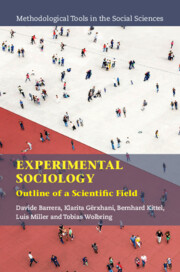Book contents
- Experimental Sociology
- Methodological Tools in the Social Sciences
- Experimental Sociology
- Copyright page
- Contents
- Figures, Tables, and Boxes
- Preface
- 1 Introduction
- Part I The Philosophy and Methodology of Experimentation in Sociology
- 2 The Development of Experimental Sociology
- 3 What Makes Sociological Experiments Different from Other Experiments?
- 4 Experiments and Causality
- 5 Experimental Designs and Typologies
- Part II The Practice of Experimentation in Sociology
- Part III Methodological Challenges of Experimentation in Sociology
- References
- Index
3 - What Makes Sociological Experiments Different from Other Experiments?
from Part I - The Philosophy and Methodology of Experimentation in Sociology
Published online by Cambridge University Press: 23 November 2024
- Experimental Sociology
- Methodological Tools in the Social Sciences
- Experimental Sociology
- Copyright page
- Contents
- Figures, Tables, and Boxes
- Preface
- 1 Introduction
- Part I The Philosophy and Methodology of Experimentation in Sociology
- 2 The Development of Experimental Sociology
- 3 What Makes Sociological Experiments Different from Other Experiments?
- 4 Experiments and Causality
- 5 Experimental Designs and Typologies
- Part II The Practice of Experimentation in Sociology
- Part III Methodological Challenges of Experimentation in Sociology
- References
- Index
Summary
The discipline of sociology focuses on interactions and group processes from the perspective of emergent phenomena at the social level. Concepts like social embedding, norms, group-level motivation, or status hierarchies can only be defined and conceptualized in contexts in which individuals are involved in social interaction. Such concepts share the property of being social facts that cannot be changed by individual intention alone and that require some element of individual adjustment to the socially given condition. Sociologists study the embeddedness of individual motivations or preferences in the context of social phenomena as such and the impact of these phenomena on individual adaptation. However, these phenomena can only be observed in individual human behavior, and this tension between the substantive focus on the aggregate level and the analytical focus on the individual level is the challenge that sociological experiments confront.
Keywords
- Type
- Chapter
- Information
- Experimental SociologyOutline of a Scientific Field, pp. 29 - 39Publisher: Cambridge University PressPrint publication year: 2024

